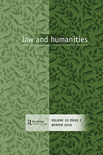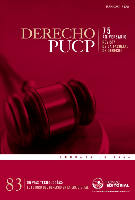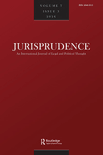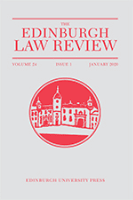
Tijdschrift voor Rechtsgeschiedenis-Revue d Histoire du Droit-The Legal History Review
Scope & Guideline
Advancing Insights in Legal History
Introduction
Aims and Scopes
- Historical Legal Analysis:
The journal emphasizes the exploration of legal systems and practices across different historical periods, with a focus on how these have shaped contemporary legal frameworks. - Interdisciplinary Approaches:
It employs a variety of methodologies, including historical, philosophical, and comparative legal analysis, to examine the evolution of laws and their societal impacts. - Regional Focus:
While it covers various legal traditions, there is a notable attention to European legal history, particularly the legal developments in the Low Countries, Italy, and the broader context of Western legal traditions. - Thematic Diversity:
The journal publishes a wide range of topics, including the intersection of law and society, legal methodologies, and the influence of historical figures on legal thought. - Critical Examination of Legal Doctrine:
It encourages critical discourse on legal doctrines and their implications, often revisiting foundational texts and legal theories from a contemporary perspective.
Trending and Emerging
- Legal History in Global Contexts:
An increasing number of papers are exploring legal history in a global context, addressing how different legal systems interact and influence one another, particularly in post-colonial settings. - Intersections of Law and Society:
There is a growing focus on the relationship between law and societal changes, particularly how legal frameworks respond to issues of identity, gender, and sexuality, reflecting contemporary societal concerns. - Methodological Innovations:
Recent publications indicate a trend towards methodological innovations in legal history, including network analysis and the digital turn, which are reshaping how historical legal data is interpreted. - Historical Perspectives on Modern Legal Issues:
Authors are increasingly drawing parallels between historical legal developments and current legal challenges, particularly in areas such as international law, human rights, and criminal justice. - Environmental Law History:
Emerging discussions around the historical development of environmental law suggest a new interest in the legal responses to ecological issues, reflecting global concerns about sustainability.
Declining or Waning
- Roman Law Specificity:
There has been a noticeable decrease in papers focusing exclusively on Roman law, suggesting a shift towards broader comparative analyses rather than isolated studies of ancient legal systems. - Obituaries and Memorials:
The frequency of obituaries and memorial articles indicates a waning interest in biographical studies of historical legal figures, as the journal shifts focus towards more dynamic legal issues. - Narrow Legal Doctrinal Studies:
There seems to be a reduction in papers that strictly analyze specific legal doctrines without contextual historical or societal implications, as the journal increasingly favors interdisciplinary approaches. - Historical Methodology Critiques:
While historical methodologies are still discussed, there appears to be less emphasis on critiques of traditional legal historiography, possibly due to a growing acceptance of diverse methodologies.
Similar Journals

Law and Humanities
Bridging Legal Inquiry with Human ExperienceLaw and Humanities, published by Routledge Journals, Taylor & Francis Ltd, serves as a pivotal platform at the intersection of legal studies and humanities, exploring the intricate relationships between law, culture, philosophy, and history. With an ISSN of 1752-1483 and an E-ISSN of 1752-1491, this esteemed journal has established its reputation within the academic community, achieving a Q2 ranking in the Arts and Humanities (miscellaneous) and a Q3 ranking in Law by 2023 metrics. It provides valuable insights and fosters critical dialogue among researchers, practitioners, and students, creating a comprehensive understanding of legal frameworks through a humanities lens. Although not currently open access, the journal's rigorous selection process ensures that published papers contribute significantly to the field, making it an essential resource for anyone interested in the dynamic interplay of law and human experience. Located in the United Kingdom, it continues to shape scholarly discourse from 2007 through its converged years, from 2014 to 2024, as it addresses the evolving challenges and inquiries that define contemporary legal thought.

Vestnik Permskogo Universiteta-Juridicheskie Nauki
Connecting Academics and Practitioners in LawVestnik Permskogo Universiteta-Juridicheskie Nauki, published by the Perm State National Research University, serves as a prominent platform for the dissemination of legal scholarship since its inception. With an Open Access policy implemented in 2009, this journal offers a wide range of legal studies, including comparative law, constitutional law, and international law, making it an essential resource for researchers, academics, and practitioners in the field. Although it is a relatively young publication, its commitment to quality and accessibility has established it as a respected voice in jurisprudence, contributing significantly to both national and international legal discourse. Researchers and students alike will find valuable insights within its pages, encompassing the latest developments and theoretical advancements within Russian and global legal systems. For those looking to stay informed on current legal issues and academic debates, this journal is a must-read.

Derecho PUCP
Transforming legal scholarship into actionable knowledge.Derecho PUCP is a distinguished open access journal published by the Pontificia Universidad Católica del Perú, specifically from the Faculty of Law. With a commitment to advancing legal scholarship, this journal has been an essential resource in the field of law since 2005, providing researchers, practitioners, and students with access to critical analyses and discussions on various legal topics. Based in Lima, Peru, Derecho PUCP holds a prestigious position with a Q2 ranking in the Law category, reflecting its impactful contributions to the social sciences, particularly in the legal domain. The journal publishes cutting-edge research and promotes innovative discourse, aiming to foster academic excellence and engage with contemporary legal challenges. As it continues to converge into its future issues from 2019 to 2024, Derecho PUCP exemplifies a vital platform for those committed to the pursuit of legal knowledge and research.

Law Text Culture
Unpacking the Interplay Between Law and Cultural Expression.Law Text Culture is a pioneering academic journal published by the University of Wollongong, Australia, and is dedicated to the interdisciplinary exploration of law, text, and culture. With its mission to foster innovative scholarly inquiry, this journal serves as a vital platform for researchers, practitioners, and students interested in the intersection of legal studies, literature, and cultural analysis. The journal's ISSN is 1322-9060 and its E-ISSN is 2200-7121. Although currently not an open access journal, it aims to contribute significantly to academic discourse, inviting submissions that critique and elucidate the complex relationships between legal frameworks and cultural narratives. As a resource with the potential for high scholarly impact, Law Text Culture is positioned to address key contemporary issues facing the legal profession and its representation in various textual forms.

AMERICAN JOURNAL OF COMPARATIVE LAW
Advancing Understanding in Comparative LawAmerican Journal of Comparative Law is a premier scholarly publication dedicated to the field of comparative law, published by Oxford University Press. Established in 1974, the journal has consistently served as a vital resource for researchers, practitioners, and students seeking insights into the legal systems across different jurisdictions. With an impressive ranking of Q3 in both the Law and Miscellaneous Social Sciences categories for 2023, it reflects a solid position in the academic landscape, ranking 400 out of 1025 in the Scopus database, placing it in the 61st percentile. The journal offers comprehensive analyses and discussions that foster understanding and dialogue around legal principles and practices, making it an invaluable tool for those involved in legal scholarship or practice. While it does not currently offer open access, the journal's commitment to high-quality, peer-reviewed content ensures that it continues to be a pivotal outlet for legal research and comparative studies.

Jurisprudence-An International Journal of Legal and Political Thought
Connecting Legal Ideologies with Societal ChallengesJurisprudence: An International Journal of Legal and Political Thought, published by ROUTLEDGE JOURNALS, TAYLOR & FRANCIS LTD, serves as a vital platform for scholars and practitioners engaged in the ever-evolving discourse of legal and political theory. With its ISSN 2040-3313 and E-ISSN 2040-3321, this esteemed journal spans a converged period from 2015 to 2024, and has established itself in the Q2 quartile of the law category, ranking #359 out of 1025 and placing in the 65th percentile as per Scopus metrics in 2023. Based in the United Kingdom, this journal is dedicated to exploring the intricate relationships between law, political ideologies, and contemporary societal issues, thereby fostering interdisciplinary dialogue that is crucial for navigating today’s complex legal landscapes. Although it does not currently provide an open access option, Jurisprudence continues to attract a broad readership of researchers, professionals, and students seeking rigorous scholarship and practical insights into legal and political thought. With its strong impact within the field, the journal plays a significant role in shaping future discussions and advancements in legal studies.

FORDHAM LAW REVIEW
Elevating Legal Discourse for Tomorrow's ChallengesFORDHAM LAW REVIEW is a prestigious legal journal published by Fordham University, School of Law, based in the United States. Established to disseminate cutting-edge legal scholarship, this journal has consistently achieved an impactful standing within the field, evidenced by its category ranking as Q1 in Law for 2023 and its Scopus ranking of #428 out of 1025 in the Social Sciences Law category, placing it in the 58th percentile. The journal welcomes submissions across diverse legal topics, fostering discourse that advances both legal theory and practice. Although it does not currently offer open access options, the Fordham Law Review serves as a vital resource for scholars, practitioners, and students seeking insights into contemporary legal challenges and developments. With its rich publication history dating back to the converged years of 1973 through 2024, the journal continues to be a cornerstone for rigorous legal analysis and a platform for influencing the evolution of law.

Edinburgh Law Review
Advancing legal scholarship at the crossroads of culture and history.Edinburgh Law Review is a distinguished journal published by Edinburgh University Press, dedicated to advancing discourse in the realm of law, cultural studies, and history. With its ISSN 1364-9809 and E-ISSN 1755-1692, this journal has been contributing valuable scholarly content since its inception in 1997, and it continues to be a vital resource for researchers, legal practitioners, and students alike. Although it currently does not provide Open Access options, the journal's rigorous peer-review process ensures that each article meets the highest academic standards. Known for its diverse range of topics, the Edinburgh Law Review holds a Q4 ranking within its categories in Cultural Studies, History, and Law in 2023, reflecting a commitment to engaging with contemporary issues in these fields. With a noticeable presence in Scopus rankings, this journal is essential for those seeking to deepen their understanding of the intersections of law, culture, and history within a British context.

University of Western Australia Law Review
Transforming Legal Perspectives Through Rigorous AnalysisThe University of Western Australia Law Review is a prestigious academic journal dedicated to the critical examination and exploration of legal issues in Australia and beyond. Published by the Law School of the University of Western Australia, this journal has become a significant resource for legal scholars, practitioners, and students alike, contributing to the rich discourse in the field of law. With an ISSN of 0042-0328 and a current categorization in the Q3 quartile in the field of Law as per the 2023 rankings, it stands among a cohort of respected legal publications. The journal, though not open access, facilitates a sharing of unique insights and research from 2019 to 2024, aiming to address emerging and traditional legal challenges within a global context. With a Scopus rank of #651 out of 1025 in Social Sciences Law, it holds a percentile of 36, reflecting its valuable contributions to legal scholarship. The University of Western Australia Law Review invites researchers, practitioners, and students to engage with its rich content and to contribute to the ongoing dialogue shaping the future of law.

Grotiana
Exploring the Intersection of History and LawGrotiana, a prestigious journal published by BRILL, stands as a vital resource for scholars and professionals engaged in the fields of History and Law. With its ISSN 0167-3831 and E-ISSN 1876-0759, this journal has been a beacon of academic inquiry since its inception, covering a diverse array of topics with an emphasis on legal history and historical jurisprudence. Grotiana holds a commendable impact within the academic community, reflected in its 2023 Scopus ranks indicating a 91st percentile in History and a 67th percentile in Law, underscoring its significance in interdisciplinary studies. Although not an open-access journal, it offers robust access options for institutions and individuals alike, facilitating research and knowledge dissemination. Scholars can benefit from its rich historical insights and rigorous legal analysis, contributing to the ongoing dialogue in these fields. With publishing cycles spanning from 1980 to 2024, Grotiana continues to uphold its commitment to excellence, making it a pivotal player for researchers, students, and professionals pursuing a deeper understanding of historical and legal frameworks.